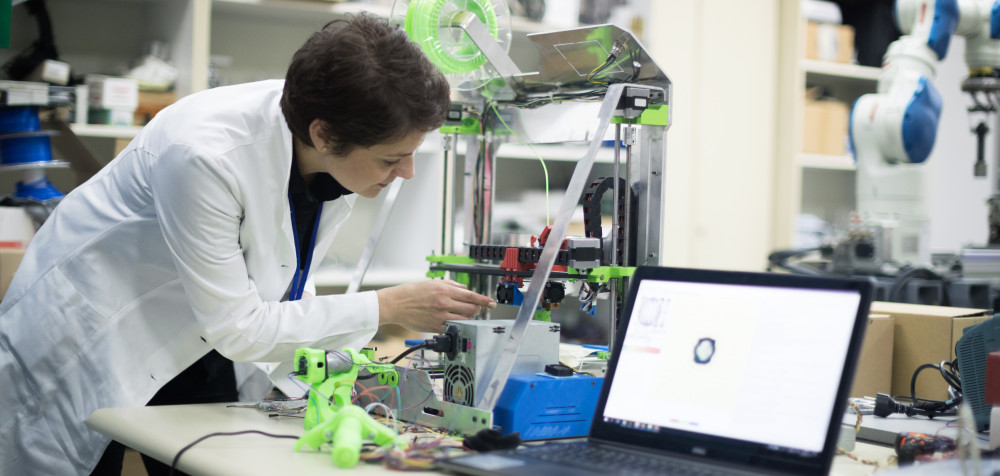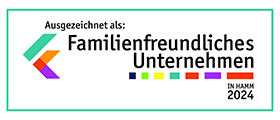Apply now
The application phase for the winter semester 2025/26 has started. You can apply until September 10, 2025.
Electronic systems are everywhere
In the age of digitization with current application areas such as connected and autonomous driving or Industry 4.0, the discipline of electronics is essential. The tight integration with computer science, which is the only way to develop complex, usually highly interactive systems, currently provides the breeding ground for more than 80% of innovations in application domains such as transport, medicine, telecommunications, automation, and smart home. Electronics is one of the most important disciplines in industry and business. Electronic engineers trained in Germany enjoy an excellent reputation worldwide.
The future has already begun
A major goal of the "Electronic Engineering" bachelor program is to prepare you for your professional work as an electronic engineer and the involved current and future challenges. In order to achieve this objective, the program not only promotes a close interrelation of the topics of electronics and computer science, but also provides a holistic understanding of system development. This allows you to apply standardized modeling techniques to develop complex systems in an interdisciplinary manner and enables you to create design models with common tools and implement them, for example, using 3D printing technologies. All in all, you are given an education that enables you to (among other things):
- develop hardware / software prototypes up to the production of printed circuit boards,
- design simple control engineering systems up to distributed technical systems / cyber-physical systems,
- model complex system behavior from requirements to system design and its prototypical implementation,
- design and implement human-centered systems.
Graduates of the "Electronic Engineering" study program gain the academic degree of "Bachelor of Engineering".
HSHL study program "Electronic Engineering"
Language Requirements
Evidence of adequate knowledge of the English language at the level B2 of the Common European Framework of Reference by means of a certificate accordingly is a condition for acceptance. The evidence must be provided by one of the following successfully taken equivalent tests:
- IELTS: minimum 6.0
- TOEFL (internet based test): minimum 80
- TOEFL (paper based test): minimum 550
- TOEFL (computer based test) minimum 213
Submission of one of the abovementioned certificates will be waived if there is a corresponding note on the final school or university entry qualification certificate on the grade of English knowledge acquired according to Common European Framework of Reference.
Any general questions?

suze / photocase.de
Maybe you will find the answer you are looking for in our "Frequently asked questions". Take a look!
find out moreBe an expert
The elective modules (Special Emphasis A and B) in the sixth and seventh semester offer the two major fields of study "Autonomous Systems" and "Embedded Electronic Engineering" for free choice.
Autonomous Systems - deep learning and cyber-physical systems
The mandatory elective "Autonomous Systems" focuses on deep learning and cyber-physical systems by deepening your competencies in the area of connected, technical systems, as well as machine pattern recognition. You will acquire competencies to understand challenges in the field of autonomous systems, such as autonomous driving, and you will be able to develop solutions for this application domain.
Embedded Electronic Engineering – mechatronic and time-critical systems
The mandatory elective "Embedded Electronic Engineering" focuses on a deepening of methods and design techniques. We focus on deepening your competencies in the field of hardware/ software co-design techniques up to design as well as analysis techniques for mechatronic and time-critical systems.
Modern Labs
As part of the practical work, students learn how to use state-of-the-art technologies and tools. Among others, the following laboratories are available: Smart Engineering Lab, PCB Engineering Lab, 3D Printing Lab, Hardware Engineering Lab, and Machinery Lab.
Career opportunities
In order to allow a direct career entry, the "Electronic Engineering" bachelor program ensures high practical relevance. Practical laboratory courses are already done in the first semesters, as addition to the theoretical principles. Here, the theoretical foundations are not only translated into practical units, but also supported by work in interdisciplinary teams, intercultural competencies as well as oral and written communication.
The "Electronic Engineering" study program enables students to take up a qualified job in many areas of industry, with service providers and in the public sector. Fields of activity can be found, among other things, in the electrical or transportation industry: automotive industry, aerospace, rail and rail transportation, automation technology, components, environmental & energy technology, medical technology, smart home, light or communications technology, industrial and consumer electronics, microsystems, robotics, and transport & logistics.
Due to the acquired technical and interdisciplinary qualifications as well as the high practical relevance of the "Electronic Engineering" program, the students have the opportunity for taking a qualified employment in specialist and management positions in the following typical areas of application: research and development, production, marketing and sales of technical products, service, and project management.
The course also enables a subsequent master's degree, which can lead to a qualified academic career.









